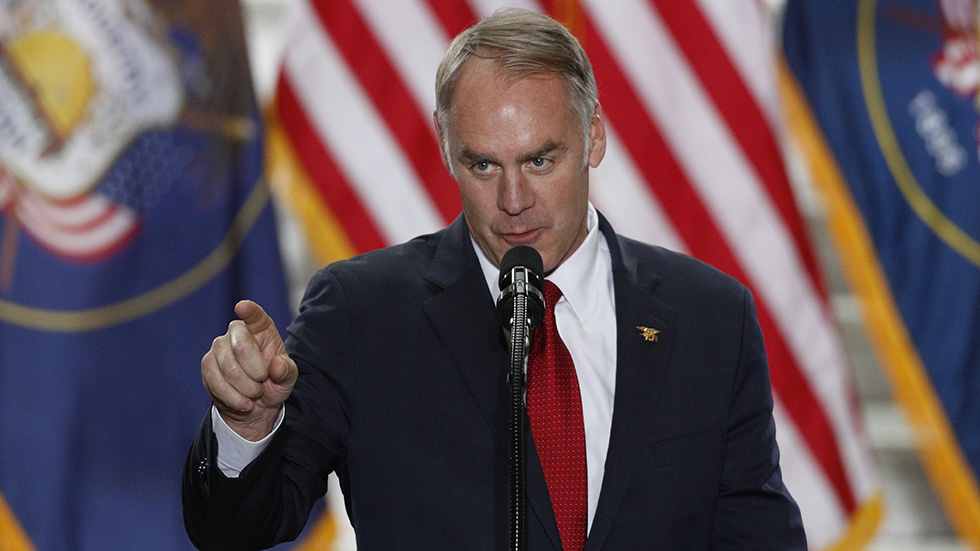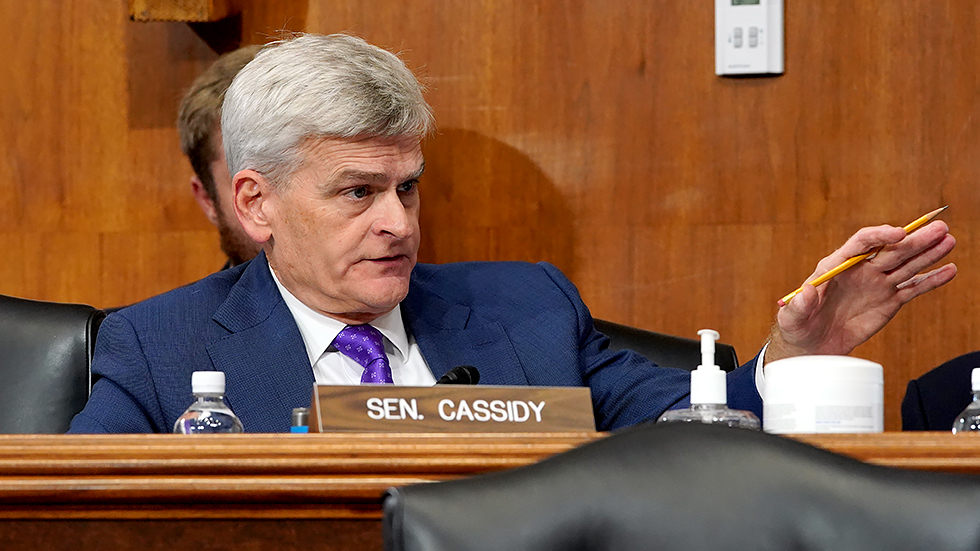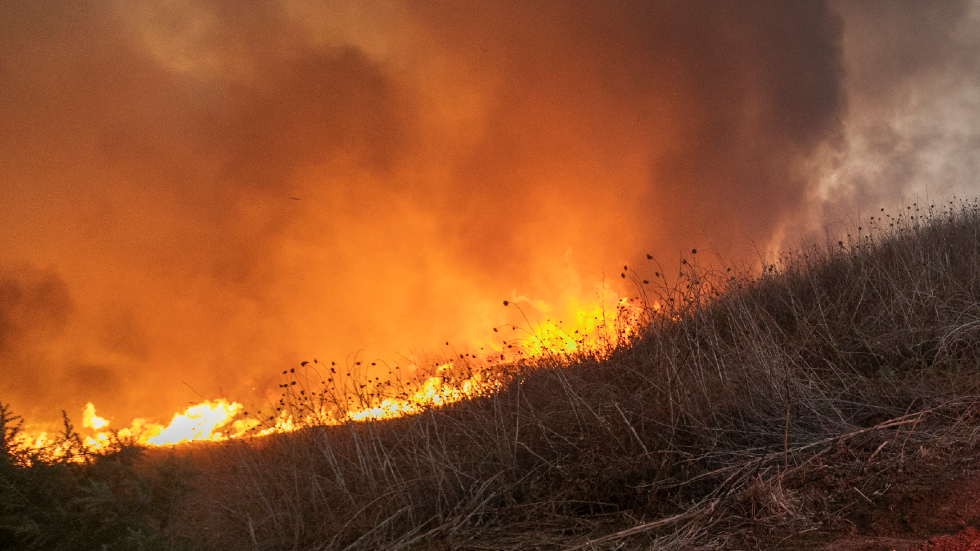Overnight Energy & Environment — Interior watchdog: Zinke broke ethics rules
Welcome to Wednesday’s Overnight Energy & Environment, your source for the latest news focused on energy, the environment and beyond. Subscribe here: digital-staging.thehill.com/newsletter-signup.
Today we’re looking at an Inspector General report on former Interior Secretary Ryan Zinke, a Republican senator placing a hold on all EPA nominees and an increase in nighttime wildfires.
For The Hill, we’re Rachel Frazin and Zack Budryk. Write to us with tips: rfrazin@digital-staging.thehill.com and zbudryk@digital-staging.thehill.com. Follow us on Twitter: @RachelFrazin and @BudrykZack.
Let’s jump in.
Interior IG finds Zinke broke ethics rules

The Interior Department’s inspector general (IG) found that former Secretary Ryan Zinke, who served under President Trump, broke ethics rules while leading the department.
The IG said in a report released Wednesday that Zinke “failed to abide by his ethics obligations” and “misused his public office for private gain.”
The IG said its office referred the case to the Department of Justice (DOJ) last summer but the DOJ under the Biden administration had declined to prosecute a case against Zinke, who is now running for a U.S. House seat in Montana.
The background: Zinke had resigned from his role with a foundation that he and others had established, called the Great Northern Veterans Peace Park Foundation, upon being confirmed as secretary and pledged in May 2017 not to participate “personally and substantially” in any matter involving it for a year, according to the report.
But the report said Zinke played an “extensive, direct, and substantive role” in representing the foundation in its negotiations over a commercial development project, called the 95 Karrow project.
It cited 64 emails and text messages from Aug. 21, 2017, through July 30, 2018, in which Zinke “communicated directly with the developers.”
It also said he held at least one in-person meeting in his office on Aug. 3, 2017, after which Zinke gave the developers a personal tour of the Lincoln Memorial and ate dinner with them.
It further accused Zinke of having Interior Department staff arrange the office and dinner meeting and said that at some point during the trip, the developers gave Zinke a plan for the parking lot, which was a significant point of negotiations.
In another instance, Zinke forwarded emails from the developers to his executive and special assistants, and his staff printed information for him, according to the report.
A department ethics official questioned Zinke about his role with the foundation in July 2018 and Zinke “violated his duty of candor when he knowingly provided materially incorrect, incomplete, and misleading answers,” the report said.
The IG said Zinke claimed the developers wanted to meet with him on a “purely social basis” and said that he “made it clear” that he resigned from the foundation’s board and no longer represented it.
Zinke responds: Zinke, who is running for one of Montana’s two congressional seats, described the report as a “political hit job,” in a statement from his campaign.
“The report is totally subjective and admitted they released it because their conclusions were too flimsy and biased for DOJ to even consider,” the campaign said.
The campaign also said investigators “didn’t even bother” to talk to Zinke or others who were allegedly involved. This contradicts the report, which says that through their attorneys Zinke, his wife and the 95 Karrow project developers, declined the watchdog’s request for an interview.
Read more about the report here.
Cassidy places hold on EPA nominees

Sen. Bill Cassidy (R-La.) on Wednesday announced a hold on the Biden administration’s Environmental Protection Agency (EPA) nominees, citing what he said were delays in approval of a Louisiana application for carbon capture wells.
The Safe Drinking Water Act allows states to apply with the EPA for underground well permitting. Louisiana has already secured such permits for five classes of wells and has applied for underground carbon sequestration wells as well. The application has not moved forward since October, according to Cassidy. Cassidy said he discussed the matter with EPA Administrator Michael Regan on Wednesday after applying the hold.
How we got here: Cassidy called the completion of the application vital to achieving the emissions reductions in the bipartisan infrastructure package President Biden signed in November. Cassidy was one of 19 Republican senators to vote for the package.
The Republican senator also noted that the administration itself has expressed support for carbon capture projects. Earlier this week, the White House Council on Environmental Quality said that the Biden administration “recognizes the imperative for CCUS [carbon capture, utilization and storage] actions to be considered in a timely manner and in the context of a strong regulatory regime.”
“Louisiana is the ideal location to store carbon underground and lower emissions. We have met the requirements and we have the workers, capacity and resources to begin this process. All that’s needed is the green light from the Biden administration,” Cassidy said in a statement. “The EPA has emphasized their desire to lower emissions and ensure a healthy environment yet hinders Louisiana’s ability to do just that.”
Read more about the hold here.
Nighttime wildfires getting stronger, faster

Nocturnal blazes have grown more intense and frequent in recent decades as hot, arid nighttime weather becomes the norm across the western U.S., a new study has found.
While such “flammable nights” were a rarity just 40 years ago — with cool, moist nights offering firefighters some respite — the changing climate has caused nights to warm faster than days, according to the study, published on Wednesday in Nature. There are now 11 more flammable nights each year in the West than there were in 1979, equivalent to a 45 percent surge, the authors found.
“Night is the critical time for slowing a speeding fire — and wildfire’s night brakes are failing,” Jennifer Balch, lead author and professor of geography at University of Colorado Boulder, said in a statement.
Balch’s team at the Cooperative Institute for Research in Environmental Sciences’s Earth Lab conducted their assessment using a key measurement of the atmosphere’s thirst called the vapor pressure deficit.
When that deficit is relatively low, cool and moist air conditions prevent fires from thriving and enable firefighters to extinguish the flames. But if the deficit is high, the resultant hot and dry conditions create a parched environment that is ideal for burning, according to the study
Read more about the assessment here.
COMING SOON FROM THE HILL
Sign up for NotedDC: The Hill’s insider take on the heartbeat of politics and policy.
KEEP HOLDING ON
Democratic Sens. Martin Heinrich (N.M.) and Tina Smith (Minn.) said they were still talking to Senate swing vote Joe Manchin (D-W.Va.) about the climate provisions of President Biden’s climate and social spending bill — even as the legislation’s prospects remain uncertain.
Asked whether they recently spoke with the swing vote senator during a press briefing, Heinrich said, “I have talked to Senator Manchin about the…climate provisions, the things that came out of the Energy Committee that he chairs, the tax provisions.”
“I am actually optimistic that we’re going to be able to get somewhere on this,” he added. “I don’t know what we’re going to call it, but there are a whole suite of things that would really help the American consumer that have 50 votes in the Senate, and it’s incumbent upon us to figure out what that Venn Diagram looks like and get it done.”
Smith said she agreed, adding that passage is urgent because “private investment is sitting on the sidelines right now, waiting for the Senate to take action.”
Manchin has also recently said he was “willing to do a lot of good things on climate,” though he opposes the Build Back Better bill at large.
ON TAP FOR TOMORROW
- The Senate Budget Committee will hold a hearing titled “Warrior Met and Wall Street Greed: What Corporate Raiders are Doing to Workers and Consumers”
- The House Natural Resources Committee will hold a hearing on climate adaptation science at the U.S. Geological Survey
WHAT WE’RE READING
- With Biden agenda stalled, money for clean energy ‘revolution’ waits on the sidelines (The Washington Post)
- Records shed new light on Trump Jr.’s costly big game hunt (E&E News)
- California Returns as Climate Leader, With Help From the White House (The New York Times)
And finally, something offbeat and off-beat: Taken for granite.
That’s it for today, thanks for reading. Check out The Hill’s energy & environment page for the latest news and coverage. We’ll see you Thursday.
Copyright 2024 Nexstar Media Inc. All rights reserved. This material may not be published, broadcast, rewritten, or redistributed..







